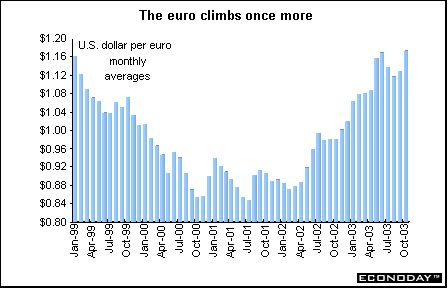Euro (€)
The euro is a new currency, created to encompass the geographic areas once the purview of the mighty German Deutschemark, French franc, etc. The transition to the euro has gone more smoothly than most expected. However, the euro has not yet stimulated economic growth there. Growth lags the United States as structural problems continue to plague investors doing business there. The euro has been rising at a steady pace recently, but it has little to do with EMU fundamentals. Rather it is a dollar problem. Geopolitical concerns combined with a general reluctance of overseas investors to buy U.S. assets have helped prop up the euro. Economic fundamentals remain stronger in the United States, but investors are wary of the escalating twin deficits (current account and fiscal).

With the onset of geopolitical concerns, investors looked outside the U.S. for a safe haven. With interest rates falling rapidly in the U.S. investors who were not risk averse began to look elsewhere for greater returns. The euro's increasing value can be attributed in large part, to a falling dollar and not better economic fundamentals in Europe. But the pendulum has been swinging back to the dollar as investors reassess growth prospects in the U.S. compared with the eurozone.
|


